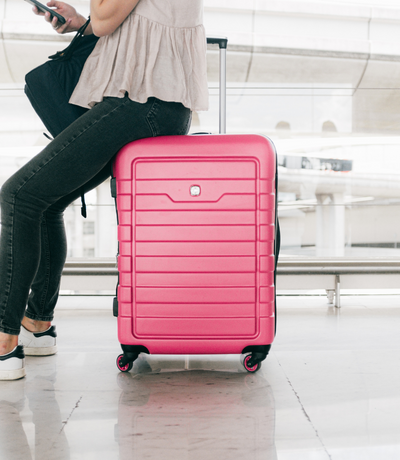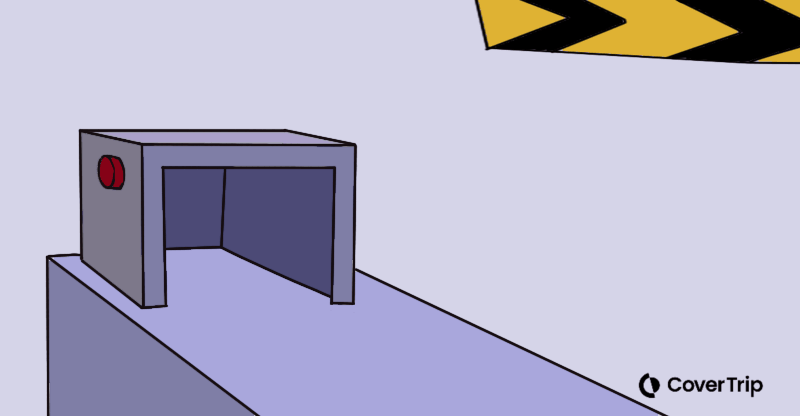9 Items You Should Never Pack in a Checked Bag
9 November 2022
The rules for what can be packed in your suitcase or backpack and tucked on the plane are complex. Some items are always prohibited. Other items can go in your carry-on but not in a checked bag, and vice versa.
If you’re confused, we don’t blame you.
The TSA’s simple rule of thumb is: when in doubt, leave it out. But it’s not that simple. Packing the wrong thing in your checked bag, even accidentally, can ruin your trip. We’re not talking about traveling light here. We’re talking about things that can set fire to the plane, land you in jail, or cost a fortune to replace.
Never, ever pack these items in your checked luggage.

1. Lithium batteries
Lithium-ion and lithium-metal batteries are only allowed in carry-on luggage, not in your checked luggage. The reason the FAA restricts these batteries from checked luggage is that they can ignite a fire if short-circuited.
Specifically, a fire in the aircraft hold could spread undetected, while a fire in the cabin can be mitigated by the crew and passengers inside.
This is why airport staff asks if your bag has a battery when you gate-check your bag.
For everyone’s sake, if you have lithium batteries in the devices you are traveling with, keep them in your carry-on.
2. Illegal medications
Don’t skip over this section because you may not know that some over-the-counter and prescription medicines commonly purchased in the US are actually illegal in other countries. How illegal? Jail-time illegal. And we’re not talking about cannabis (that’s a whole other set of rules); here are some examples:
- Sudafed is illegal in Japan
- Pain meds like codeine or tramadol are illegal in Greece and Saudi Arabia
- Allergy meds like Benadryl are illegal in Zambia and limited in Japan
- ADD medications like Adderall and Ritalin are illegal in Japan and Saudi Arabia
Even a small amount of OTC medication could trigger an arrest, fines, or even jail time.
Pro tip: Check the travel.state.gov site before you leave so you know what medications are banned.
3. Electronics
Your beloved electronics are too fragile and valuable to go in your checked bag. Remember, once your bag is out of your control, it’s at the mercy of overworked baggage handlers. This week, a baggage handler was allegedly seen ‘aggressively’ hurling luggage to the shock of passengers on board.
Don’t expect the airline to pay for damage either. Their contract of carriage makes it very clear that they are not responsible for damaged electronics.
Keep the electronics you need and love in your carry-on luggage.
4. Valuables (cash, jewelry, irreplaceable items)
The airline contract of carriage makes it clear they are not liable for lost or stolen valuables. Once your bag is out of sight, it’s in the hands of other people. A TSA-approved lock may help prevent theft, and photographing the contents will help you file a claim with your travel insurance.
Tip: See how travel insurance covers theft for more details and a list of what items are never covered.
5. Passports or other essential documents
Be mindful of transporting any valuable documents in your checked bags. They can contain personal, private information that could be stolen and lead to identity theft. This includes spare IDs, passports, passport cards, and any other document with personally identifying information on it.
Keep essential documents with you when you travel; never let them out of your sight.
6. Matches, lighters, e-cigs, and vape pens
According to the TSA’s list of what you can bring, you can carry a single pack of safety matches in your carry-on (although why that’s allowed is a mystery), but not in your checked luggage.
Here are the specifics:
- Strike-anywhere matches are always prohibited.
- Disposable lighters without fuel can be packed in carry-on bags.
- Up to two lighters with fuel can be stored in a checked bag if they are in DOT-approved cases 😕
- E-cigs and vape pens cannot be in your checked luggage.
Essentially anything that can be flammable (think paint, nail polish remover, liquid fuel) should be avoided entirely.
7. Certain foods and alcohol
When traveling internationally, there are rules about packing certain foods and alcohol.
Some foods are not allowed to enter the US from abroad. See the US Department of Agriculture list for specifics.
Most types of alcohol can be packed in your checked luggage as long as it’s less than 140 proof (those are not allowed in checked or carry-on luggage).
Note: Travelers to Hawaii have specific restrictions they must adhere to as well.
8. Firearm-related material
You’d expect weapons to be banned in carry-ons, but firearm-related materials like gunpowder, grenades, and flares are prohibited entirely.
Other items like rifles and pellet guns can be packed in a checked bag, however. See the TSA website for specific packing information.
9. All of your clothing
The odds are you’ll see your suitcase drop onto the baggage carousel when you arrive, but bags can go missing. Sometimes for a few hours, sometimes for days or weeks.
If all of your clothing is in the bag that goes missing, even temporarily, you could be waiting poolside in your traveling clothes.
Experienced travelers always have the basic clothing items they need to feel comfortable and fresh while they wait for either:
- their bag to appear, or
- stores to open so they can buy some clothes to tide them over.
Pro tip: At the very least, always stash a pair of underwear and basic toiletries in your carry-on.
Related topics
Damian Tysdal is the founder of CoverTrip, and is a licensed agent for travel insurance (MA 1883287). He believes travel insurance should be easier to understand, and started the first travel insurance blog in 2006.
